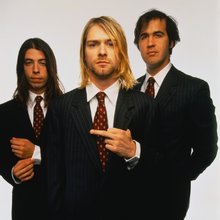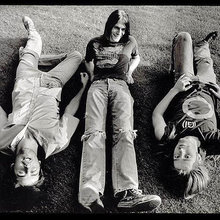Few bands in rock history have had a more immediate and tangible impact on their contemporary pop musical landscape than Nirvana did in the early Nineties. When the Seattle trio hit the scene in 1991, mainstream radio was awash in the hair metal of Poison and Def Leppard. But seemingly within hours of the release of Nirvana's anarchic, angry single "Smells Like Teen Spirit" — and its twisted anti-pep-rally video—the rules had changed. Artifice was devalued; pure, raw emotion was king.
Kurt Cobain, Nirvana's leader, was Seattle's resident genius — and a tortured one at that. Nirvana's reign was tragically cut short on April 5, 1994, when Cobain took his own life following at least one earlier suicide attempt and severe bouts with drug addiction, a chronic stomach ailment, and depression. He was 27.
Cobain and Krist Novoselic grew up in Aberdeen, Washington, a small logging town 100 miles southwest of Seattle. When Cobain was eight, his secretary mother and auto-mechanic father divorced, leaving him constantly moving from one set of relatives to another. As a child he loved the Beatles, but by nine discovered the heavier music of Led Zeppelin, Black Sabbath, and Kiss. Cobain met the 6-foot-7-inch Novoselic, son of a local hairdresser, through mutual friend Buzz Osborne of the Aberdeen band the Melvins. Osborne introduced them to the hardcore punk of Black Flag and Flipper.
In 1987, Cobain and Novoselic, both of whom had long felt alienated from their working-class peers, formed Nirvana and started playing parties at the liberal Evergreen State College in nearby Olympia. The following year, Seattle independent label Sub Pop signed the band and released its first single, "Love Buzz" b/w "Big Cheese."
Nirvana's debut album, Bleach, recorded for $606.17, came out in 1989 to kudos from the underground-rock community. It sold an initial 35,000 copies—considerable for an indie-label release. The next year, Nirvana put out another Sub Pop single, "Sliver" b/w "Dive," and recorded six new songs (including "Smells Like Teen Spirit") with producer Butch Vig. They also dismissed Channing and hired Dave Grohl of D.C. hardcore band Scream. Although opposed to major labels in principle, the band claimed it shopped the songs to bigger companies in hopes of getting its message to a larger audience.
A major-label bidding war ensued, with DGC ultimately offering the group a $287,000 advance (rumors had it at $750,000). With Nevermind, Nirvana succeeded at getting its rowdy rally to the populace on a grand scale: After an initial shipment of 50,000 copies, the record kept selling, eventually bumping new albums by Michael Jackson, Garth Brooks, U2, and MC Hammer from the top of the chart. Nevermind ultimately sold 10 million copies in the U.S. alone. It also produced another hit, "Come as You Are" (Number 32, 1992). In the wake of that success, Cobain explored a few pet projects, including performing frayed guitar feedback on William Burroughs' The "Priest" They Called Him spoken-word CD and coproducing the Melvins' Houdini album
By early 1992, Nirvana's success was biting back. As "Smells Like Teen Spirit" continued climbing up the charts, Cobain began bemoaning the group's meteoric rise, worrying that fans were missing the point of Nirvana's antiestablishment message. Cobain's expressions of support for women and homosexuals also challenged the earlier rock & roll status quo.
Simultaneously, his new relationship with Courtney Love, singer of the band Hole, had become a hot topic in the gossip columns. The couple married on February 24. When Love became pregnant with Cobain's child and was quoted in a Vanity Fair article as admitting she had used heroin during the pregnancy, the couple's alleged drug addiction became the subject of intense media scrutiny.
Attention to the Cobain-Love affair reached a level of intensity matched in the pop world only by John Lennon and Yoko Ono, or the fated punk couple Sid Vicious and Nancy Spungen. On August 18, 1992, the Cobains delivered a healthy seven-pound baby, Frances Bean (named after the tormented, lobotomized Forties film actress Frances Farmer). After a battle with children's services in L.A., which challenged the Cobain's parental fitness based on Love's comments in Vanity Fair, the couple was granted custody of the child. Amid the chaos, Nirvana released Incesticide, a collection of early singles and outtakes.
Beginning in spring of 1993, a series of events occurred that foreshadowed the demise of Cobain and Nirvana. On May 2, the singer overdosed on heroin at his Seattle home. The following month, he was charged with domestic assault after Love summoned the police during an argument over Cobain's gun collection. On July 23, Cobain overdosed again, this time in the bathroom of a New York hotel room before a Nirvana show at the Roseland Ballroom.
On September 21, Nirvana released In Utero, which debuted at Number One and produced the Modern Rock radio hits "Heart-Shaped Box" and "All Apologies." On January 7, 1994, Nirvana performed what would be their last American concert, at the Seattle Center Arena. On February 6, the band departed for a European tour, but after a series of shows in France, Portugal, the former Yugoslavia, Germany, and Italy, decided to take a break, during which Cobain remained in Rome. At 6:30 a.m. on March 4, Love found Cobain unconscious in the couple's room at Rome's Excelsior Hotel, the result of an overdose of the tranquilizer Rohypnol. At first deemed an accident, later reports uncovered a suicide note. Cobain remained in a coma for 20 hours. He woke up and returned to Seattle. On March 18, police arrived at the Cobain home again after the singer locked himself in a room with a .38-caliber revolver, threatening to kill himself.
On March 30, Cobain checked in to the Exodus Recovery Center in L.A., but fled on April 1, after telling staff members he was going outside for a smoke. On April 8, he was found dead in a room above the garage of the couple's Seattle home, the result of a self-inflicted .20-gauge shotgun wound to his head. For weeks afterward, fans, the news media, MTV, and radio mourned his death with specials about Nirvana and the generations they inspired. In November 1994, MTV Unplugged in New York, an album of the acoustic show taped in 1993, was released. It debuted at Number One, sold 5 million copies and, in 1995, won a Grammy for Best Alternative Music Album.
Novoselic and Grohl made a post-Nirvana performance appearance together in 1994 in Olympia, Washington, where they joined the Stinky Puffs onstage for a set that included the Puffs' "I Love You Anyway," a song for Cobain. Grohl soon found success leading his new band the Foo Fighters, and, with Novoselic, gathered 16 live Nirvana performances recorded between 1989 and 1994 for From the Muddy Banks of the Wishkah.
While Novoselic turned to alcohol in the months after Cobain's suicide, he eventually stopped drinking and formed a political action committee (JAMPAC, for Joint Artists and Music Promotions Political Action Committee) to battle censorship. In 1994 he picked up a guitar and joined Venezuela-born singer-bassist Yva Las Vegas for the short-lived band Sweet 75, which released a self-titled album on Geffen in 1997. Novoselic occasionally played with a band called Sunshine Cake, but, by decade's end, most of his energy was spent on political activism, performing with Soundgarden's Kim Thayil and Dead Kennedys founder Jello Biafra as the No WTO Combo during protests against the World Trade Organization's 1999 gathering in Seattle. A live album, Live From the Battle in Seattle, was released by Biafra's Alternative Tentacles label in 2000.
Nirvana's impact was also felt by some of Cobain's own musical heroes, heard in such Cobain tributes as Neil Young's Sleeps With Angels album and Patti Smith's song "About a Boy." After years of legal-wrangling, With The Lights Out was released, exposing a box-set collection of the band's rawest demos and studio outakes in November 2004. The 2009 album Live at Reading, captured at the British music festival in 1992, captured Nirvana at the peak of "Teen Spirit" mania. The band doesn't sound quite overwhelmed by their newfound fame, playing a blistering set that had long been bootlegged.

